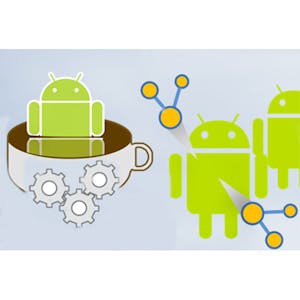This Android App Development Specialization offered by Vanderbilt University is designed to equip learners with the knowledge and skills necessary to develop and maintain mobile apps for the Android platform. Throughout the specialization, learners will cover core Java programming language features and software patterns essential for developing maintainable mobile apps. The course culminates in a Capstone project that integrates the material from the previous modules, allowing learners to showcase their ability to create an interesting Android app.
The Specialization comprises five modules, each focusing on different aspects of Android app development:
Certificate Available ✔
Get Started / More Info
The Android App Development Specialization comprises five modules, covering core Java programming, Android app components, maintainable app engineering, and culminating in a Capstone project to showcase learners' skills and creativity.
This module, "Java for Android," focuses on programming core features and classes from the Java programming language used in Android, covering key Java programming language features, access to structured data, and customizing the behavior of existing classes via inheritance and polymorphism. Learners will apply these Java features in the context of core Android components by using common tools such as Android Studio and working on hands-on projects throughout the module.
The "Android App Components - Intents, Activities, and Broadcast Receivers" module delves deeper into core Android app components, such as intents, activities, and broadcast receivers. Learners will also learn about Android concurrency frameworks, basic Java file I/O classes, and Android storage mechanisms. Throughout the module, learners will work on a project involving downloading, storing, and displaying images from remote websites, incrementally adding additional capabilities based on the material covered in the lecture videos.
The "Android App Components - Services, Local IPC, and Content Providers" module builds upon the core Android app components and concurrency frameworks covered in the previous module. Learners will focus on started and bound services, local inter-process communication (IPC), and content providers, with a hands-on project involving a material design-based RSS reader app, incrementally adding additional capabilities based on the material covered in the lecture videos.
The "Engineering Maintainable Android Apps" module demonstrates various methods for engineering maintainable Android apps, including test-driven development methods and applying common Java/Android software patterns to improve the extensibility and clarity of Android apps. The module also emphasizes the benefits of good software engineering practices targeted at creating maintainable code for mobile apps.
The Capstone project, "Capstone MOOC for 'Android App Development,'" integrates material from throughout the Specialization to exercise and assess the ability of learners to create an interesting Android app. This project enables learners to apply knowledge and skills learned in previous MOOCs in the Specialization, including Java programming features, Android activity, broadcast receiver, service, and content provider components, and unit, integration, and user interface testing. The project itself is intentionally designed to enable learners to create a customized app that demonstrates their creativity and mastery of the Specialization topics.
Learn how to effectively test your Django web application using Django's rich testing framework in this 2-hour project-based course.
Learn to build a single-page website using HTML and CSS in this 1-hour project-based course. Gain essential skills for web development and apply them to more complex...
A comprehensive course on using Django web framework to create, protect, and manage a web server. Learn to design web applications, implement security best practices,...
Learn to build a simple website about books using HTML and CSS in just one hour.